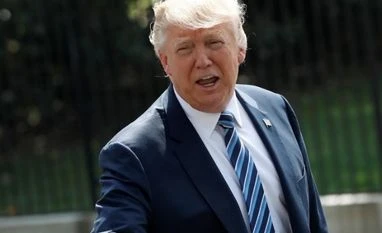1. What’s at stake?
Three of the biggest killers in the developing world are AIDS, tuberculosis and malaria. Currently 36.7 million people are living with HIV/AIDS, a third of the world’s population is infected with tuberculosis and more than one million people die from malaria each year.
Trump’s executive order endangers $6.8 billion in annual funding for the President’s Emergency Plan for AIDS Relief. Former President George W. Bush created this initiative, known as PEPFAR, to help save the lives of people suffering from HIV/AIDS.
The U.S. put $1.35 billion of that money into the the Global Fund to Fight AIDS, Tuberculosis and Malaria last year. This independent organization is the largest entity dedicated to preventing and treating these diseases. The U.S., its top donor, covers half the Global Fund’s operating costs, but that represents only a quarter of what our nation spends to fight these diseases internationally. Some $600 million in family planning aid is affected, as is other spending slated for global health.
Although I follow these issues closely, I have been unable to find a complete breakdown of the widely reported $8.8 billion affected.
Women compose 51 percent of the people living with HIV/AIDS worldwide. Since 60 percent of the people with the virus in sub-Saharan Africa are women, they may bear the brunt of this move.
2. How does the US support global efforts to fight and treat HIV/AIDS?
PEPFAR, primarily implemented through USAID, the National Institutes of Health and the Centers for Disease Control and Prevention, emphasizes improving the health of women, newborns and children. Among its biggest achievements has been integrating AIDS relief and reproductive health services, since HIV is transmitted primarily through unprotected sex.
Until now, PEPFAR has commanded broad bipartisan support, perhaps due to its well-documented success. For the first time since the HIV/AIDS epidemic began in the 1980s, new HIV infections in sub-Saharan Africa – which accounts for almost two-thirds of all people living with HIV/AIDS – are decreasing. Former President Bush, who traveled to Botswana and Namibia in April, still champions the program.
3. How is global health aid connected to abortion?
An estimated 303,000 women, primarily in developing countries, die yearly from complications due to pregnancy, childbirth and abortion, and those are the leading causes of death among adolescent girls globally. Approximately one-third of maternal deaths could be prevented if all women had access to effective contraception.
The U.S. is the world’s largest supporter of family planning and reproductive health services. It is also one of the largest purchasers and distributors of contraceptives. No federal funds have paid for abortions, however, since 1973 – either internationally or at home. All nongovernmental organizations receiving U.S. support must agree to this policy.
In 1984, the Reagan administration expanded those restrictions by denying U.S. family-planning money to entities that performed abortions or promoted the practice. Subsequent Democratic presidents lifted this restriction, known either as the “Mexico City policy” or the “global gag rule,” while Republican presidents reinstated it.
Trump framed his new order as “Protecting Life in Global Health Assistance,” but it’s unlikely to reduce the number of abortions performed in poor countries. A 2011 study by Stanford University researchers found that abortion rates in sub-Saharan African countries rose when the standard restrictions were in force from 2001 to 2008.
4. How does Trump’s action stray from Republican precedents?
The Trump administration has expanded the policy’s reach, broadening it to encompass all foreign health care providers that receive U.S. funding rather than only those that get family planning dollars. For example, any group that does sexual health education to prevent the spread of HIV and also informs women that abortion is legal where they live will lose their U.S. support. They would have remained eligible for that money had Trump followed the pattern set by the past three Republican administrations.
The exact repercussions are unknown. The State Department, under Rex Tillerson’s leadership, plans to review the impact within six months.
5. Can other donors bridge the gaps?
It’s unclear which organizations will agree to these new restrictive terms or what will happen to spending. The administration says it will redistribute funds from organizations that refuse to comply to those that will.
But those other groups may not exist. As Johnathan Rucks of the global health group PAI told The New York Times: “It’s not like we have an influx of providers in places like West Africa.”
Given the limited alternatives, the number of unmet health needs will surely rise, particularly for women and children. In March, other governments and private funders announced they had raised $190 million for international family planning to narrow the anticipated gap caused by the Trump administration’s policies. Now, that’s probably just a drop in the bucket of what will be needed.
Bill Gates, a philanthropist who with his wife Melinda gives more than $4 billion away every year, mostly to improve global health and fight poverty, told The Guardian that Trump’s expansion of the policy could “create a void that even a foundation like ours can’t fill.”
Maureen Miller, Professor, Columbia University Medical Center
This article was originally published on The Conversation. Read the original article.
To read the full story, Subscribe Now at just Rs 249 a month
Already a subscriber? Log in
Subscribe To BS Premium
₹249
Renews automatically
₹1699₹1999
Opt for auto renewal and save Rs. 300 Renews automatically
₹1999
What you get on BS Premium?
-
Unlock 30+ premium stories daily hand-picked by our editors, across devices on browser and app.
-
Pick your 5 favourite companies, get a daily email with all news updates on them.
Full access to our intuitive epaper - clip, save, share articles from any device; newspaper archives from 2006.
Preferential invites to Business Standard events.
Curated newsletters on markets, personal finance, policy & politics, start-ups, technology, and more.
Need More Information - write to us at assist@bsmail.in
)